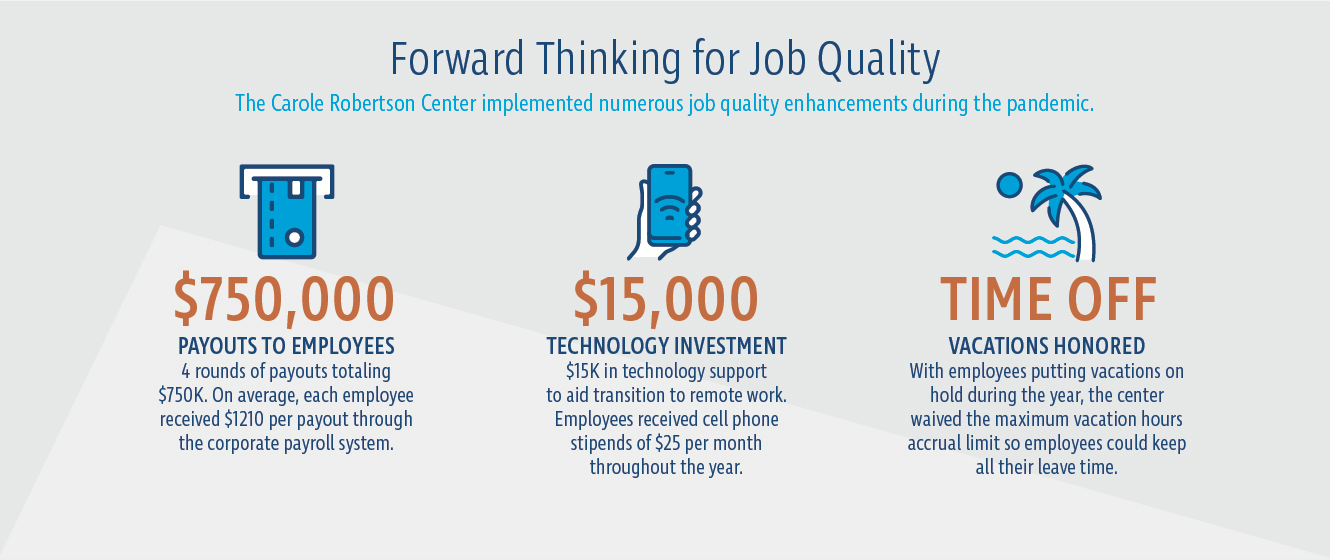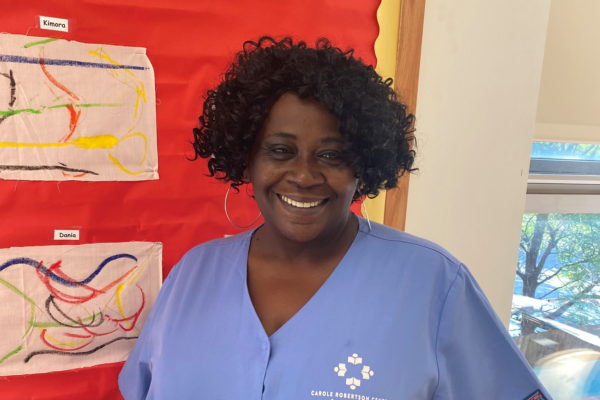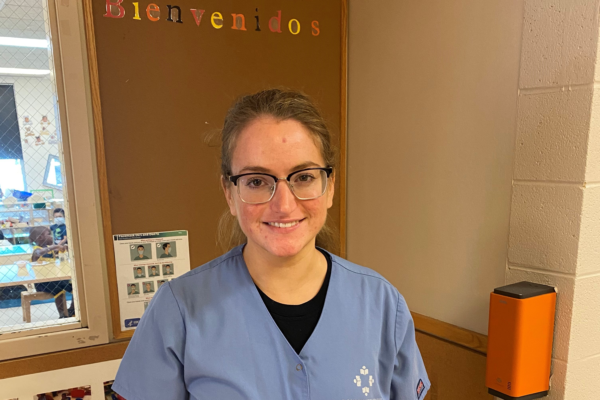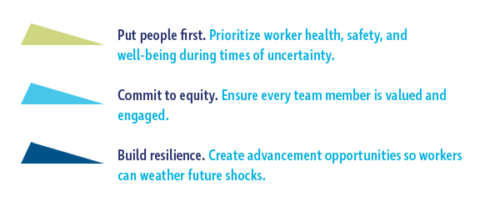Carole Robertson Center for Learning
Strengthened in Crisis
This profile is part of the Frontline Forward series. Frontline Forward recognizes employers whose good jobs practices have protected, supported, and developed frontline workers throughout the coronavirus pandemic. The key job quality practices and policies that are highlighted throughout the profile are drawn from the National Fund’s Job Design Framework. Designing quality jobs is good for workers, businesses, and their communities.
On Chicago’s west side, families rely on the Carole Robertson Center for Learning for far more than early childhood development and education. Teachers and staff members provide a safety net for families, feeding nearly 1,000 children from birth to age 17, keeping the little ones diapered and tending to their many needs throughout the day while parents are at work.
To serve its mission as a trusted and valued community partner, the center must also keep safe and support its 200 staff members, 90% of whom live in the surrounding zip codes of its multiple locations. When the pandemic hit, said President and CEO Bela Moté, it hit the community, and the center, hard.

Employer responds to a community in crisis
“Between the harsh realities of COVID’s high positivity rates and racism and social unrest in the communities that we serve, the reality that we woke up to every morning was that our families were at the greatest risk compared to other zip codes across the city,” Moté said. “A couple of things took place in a short period of time that left us with more questions than answers. We had a [COVID] case before the shelter-in-place order came down that was very grave, the parent was hospitalized, and we had no blueprint, nothing to follow.”
The staff needed to pivot quickly when the center temporarily closed its doors—and they did. Teachers said that the organization’s open communication – with them as well as with the community – and its willingness to engage staff in self-management and problem solving made it possible for them to be flexible and adjust quickly to a changed environment.
“We were able to jump right in and get some things done,” said lead teacher Crystal Sanders. “Of course, there were a few glitches, but they were able to get over those glitches and get us on the right track, considering we had to be at home doing everything.”
 |
– Crystal Sanders, Lead Teacher |
A culture of trust fuels quick problem-solving
Teachers and executive staff split into teams to address all the issues that would allow them to continue to serve families and support staff throughout the pandemic. How would they communicate? Zoom versus Microsoft Teams? What safety measures did they need to take? How would they deliver food, diapers, and formula to families while classrooms were closed? How would they handle sick leave or vacation time? What needed to change in the classroom? For children who would be taught remotely, what would that look like?
“There was a group of people waking up each day thinking about these issues and executing a plan,” Moté said.
Lyndsey Caliendo is a teacher who served on one of the problem-solving teams. “They gave us a lot of freedom,” she said. “When we talked about what we were doing with our virtual classrooms, the teachers were encouraged to do things the way we were used to doing but adapt to the virtual setting. We have a curriculum, but we are given freedom to adapt to our students’ needs. We were encouraged to do what we thought was best for our kids.”
– Lyndsey Caliendo, Teacher |
 |
Policy changes that preserve jobs and keep workers and kids safe
Out of these teams emerged multiple strategies.
At a time when many workers faced reduced hours or layoffs, the Carole Robertson Center provided job security. “We never needed to cut any salaries, but if we had we would have started with mine,” Moté said.
More than once they offered staff financial incentives, such as retention stipends, “to recognize that they were there with us for the long haul,” Moté said. They also covered salaries for workers who tested positive or needed to quarantine because they were potentially exposed to the virus.
They stepped up cleaning efforts and supplied staff with N95 masks and other personal protective equipment. “We wanted teachers to see their employer was making an investment in their safety,” Moté said.
After a brief, initial shutdown, staff returned in stages to reconfigure their classrooms and be trained on pandemic safety protocols, such as taking temperatures, identifying children who might be ill, and escorting children to their rooms to prevent family members from entering the building and increasing potential exposures.
“When we came back in June [2020], they had everything set up for it to be safe for us and safe for children and families,” Sanders said.
Leadership shows up in everybody when there’s real work to do
If problems arose, such as parents who tried to ignore safety protocols, Sanders said she could raise the issue with the leadership team and get immediate support. “They’ve always listened to our ideas, and if we had a solution, if it was possible for them to use it, they’d use it. I’ve always had the opportunity to have a say in some of the decisions that are being made.”
While the crisis put a strain on staff, it also surfaced positive new practices and highlighted strengths within the organization, Moté said.
“Different tiers of the organization needed to come together in ways we had not come together before. That is a silver lining. There was a deep dedication on all fronts that we needed to push forward. Leadership shows up in everybody when you have real work to do.”
About Frontline Forward
With Frontline Forward, the National Fund for Workforce Solutions recognizes employers whose good jobs practices have protected, supported, and developed frontline workers throughout the pandemic and beyond. These businesses have made the workplace safer and provided compassion, support, and flexibility to families during this time of illness and uncertainty. They offer advancement opportunities, so workers are more resilient to future shocks. Most importantly, they’ve created a workplace culture that ensures every team member is valued and given the chance to take part in their own — as well as the company’s – success.
The Frontline Forward Principles

Frontline Forward is made possible through a generous investment from Walmart to engage service sector employers to improve the quality of their jobs.

